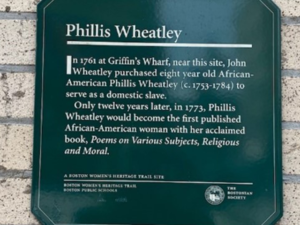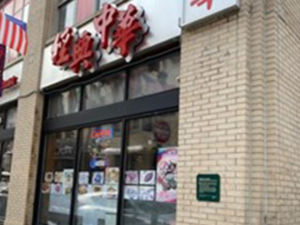Who Was Phillis Wheatley?
Written by Terry Witherell, Executive Director, First Literacy
 “Imagination! who can sing thy force? Or who describe the swiftness of they course? Soaring through air to find the bright abode, The empyreal palace of the thundering God, We on thy pinions can surpass the wind, And leave the rolling universe behind: From star to star the mental optics rove, Measure the skies, and range the realms above. There in one view we grasp the mighty whole, Or with new worlds amaze the unbounded soul.”
“Imagination! who can sing thy force? Or who describe the swiftness of they course? Soaring through air to find the bright abode, The empyreal palace of the thundering God, We on thy pinions can surpass the wind, And leave the rolling universe behind: From star to star the mental optics rove, Measure the skies, and range the realms above. There in one view we grasp the mighty whole, Or with new worlds amaze the unbounded soul.”
– Excerpt from “On Imagination”, by Phillis Wheatley
A Poet and a Slave
Until I came to First Literacy, I had not learned of this amazing woman, who was stolen from her family in Africa at the age of eight, brought to Boston in 1761 on a slave ship not speaking a word of English, and who wrote her first poem in English only four years later.
The ugly truth is that Phillis got her name from the ship that brought her to this country; and Wheatley is the name of the family that bought her. In 1772, at the age of 17, Phillis appeared in front of the most influential men in Boston, including the governor; she was on trial to “prove” that she in fact wrote her own poetry, so that it could be published under her name. Following that trial, Phillis travelled to London with a member of the Wheatley family where her book of poetry was published. She became the most famous black woman of her time, meeting many dignitaries including Ben Franklin.
The Ugly Side of Boston History
There is a plaque in honor of Phillis Wheatley on the corner of one of the buildings on Beach Street in Boston’s Chinatown, placed there as part of the Boston Women’s Heritage Trail. Beach Street in Chinatown is so named because in the 1700s, the harbor water came up to that part of Boston; and thus, that was the beach.
It was there that the slave ships docked, and the people of Boston would come there to buy and sell other human beings. This is part of the uglier history of Boston that is so important to remember, acknowledge, and reconcile; especially as we mark Black History Month.
Free At Last but Not Without Controversy
Phillis obtained her freedom in 1774. She married and took the name Peters, but her life was not a happy one. Two of her children died in infancy; and alone and living in poverty, she and her last baby died when Phillis was only 31.
In 2003, Henry Louis Gates, Jr wrote “The Trials of Phillis Wheatley”. In it, he points out that Phillis was a controversial figure in her lifetime, and she continues to be long after her death. Back in the 1700s, the old white men of Boston found it impossible to believe that a young black girl could write such complicated poems and verse. Gates points out that while Phillis was vilified by many white writers in her day, in more recent history she has been vilified by some black writers as being an embarrassment to her race, someone who acquiesced to her white slave owners.
But Gates says, “The challenge isn’t to read white, or read black; it is to read. If Wheatley stood for anything, it was the creed that culture was, could be, the equal possession of all humanity. It was a lesson she was swift to teach, and that we have been slow to learn. But the learning has begun.”
Celebrating Those who Overcome Adversity
Here at First Literacy, our mission is to help everyone have the chance to learn to read. It is in reading that we can think for ourselves. Being able to read allows everyone the opportunity to learn, to grow, to get a better job, and to improve their lives and the lives of their families and those in their community.
We can face the awful truth that a little girl was taken from her family and sold into slavery right here in Boston. We can celebrate that she rose above that awful reality to become a celebrated writer and author of her time. We can mourn the fact that she died at 31 in poverty and obscurity.
And at First Literacy, we can honor her memory by continuing to help those who want to learn to read.
To learn more about how First Literacy is helping adult learners overcome adversity read our scholar stories.
